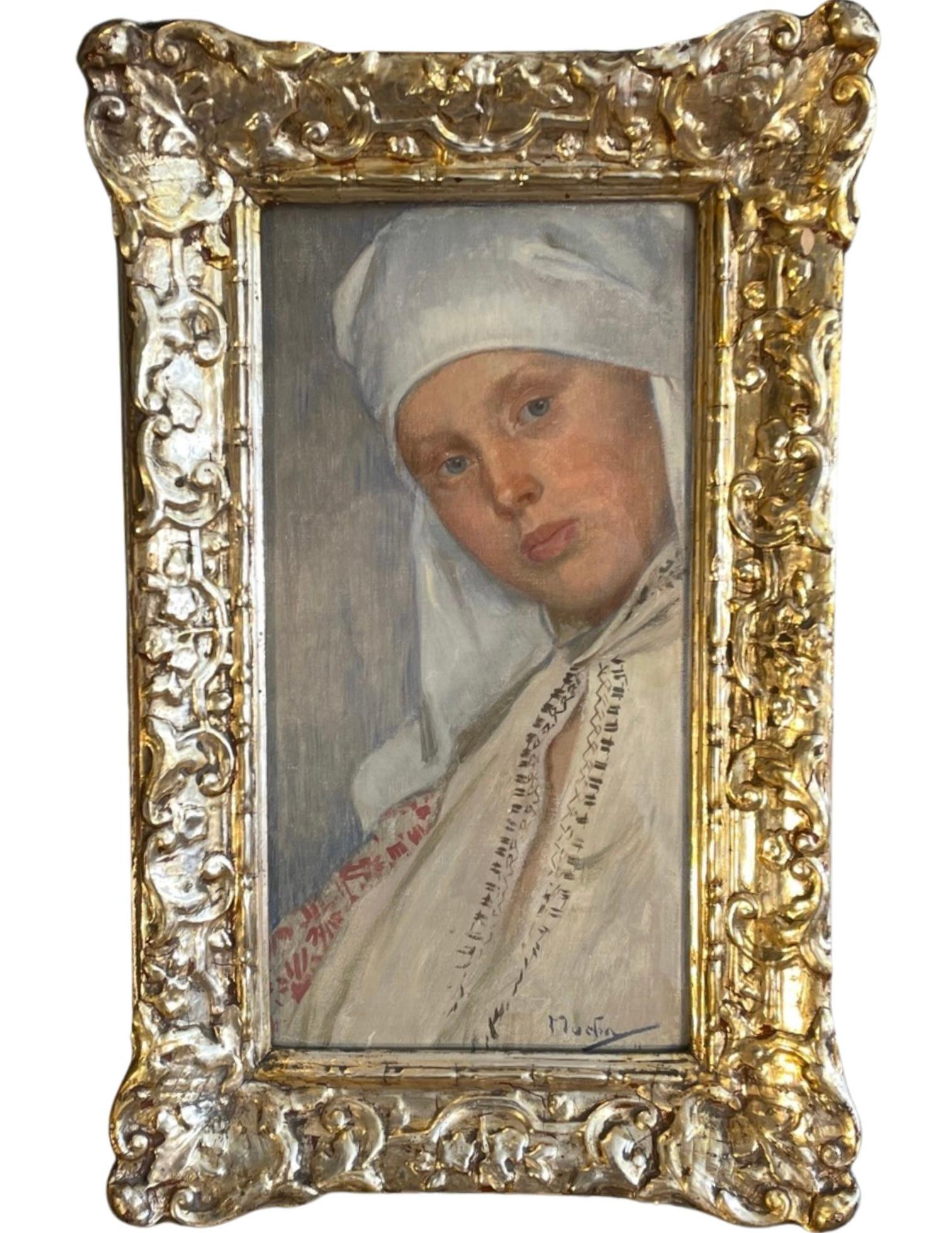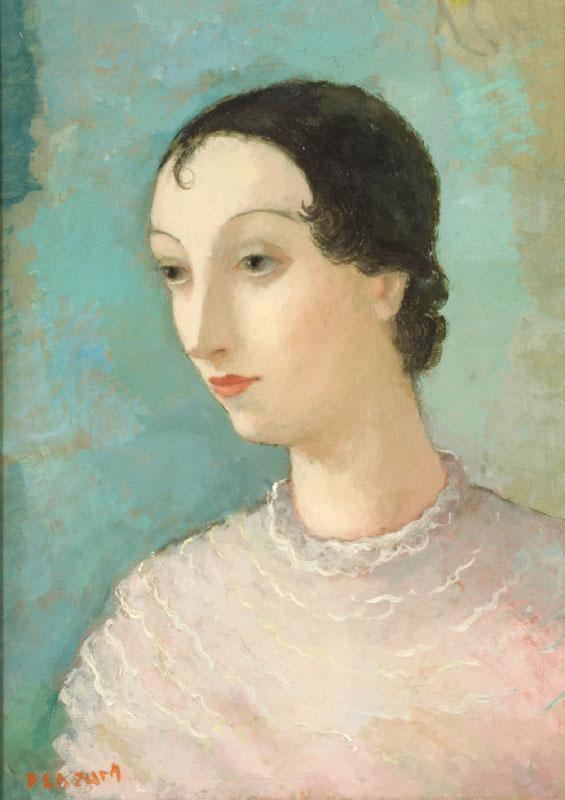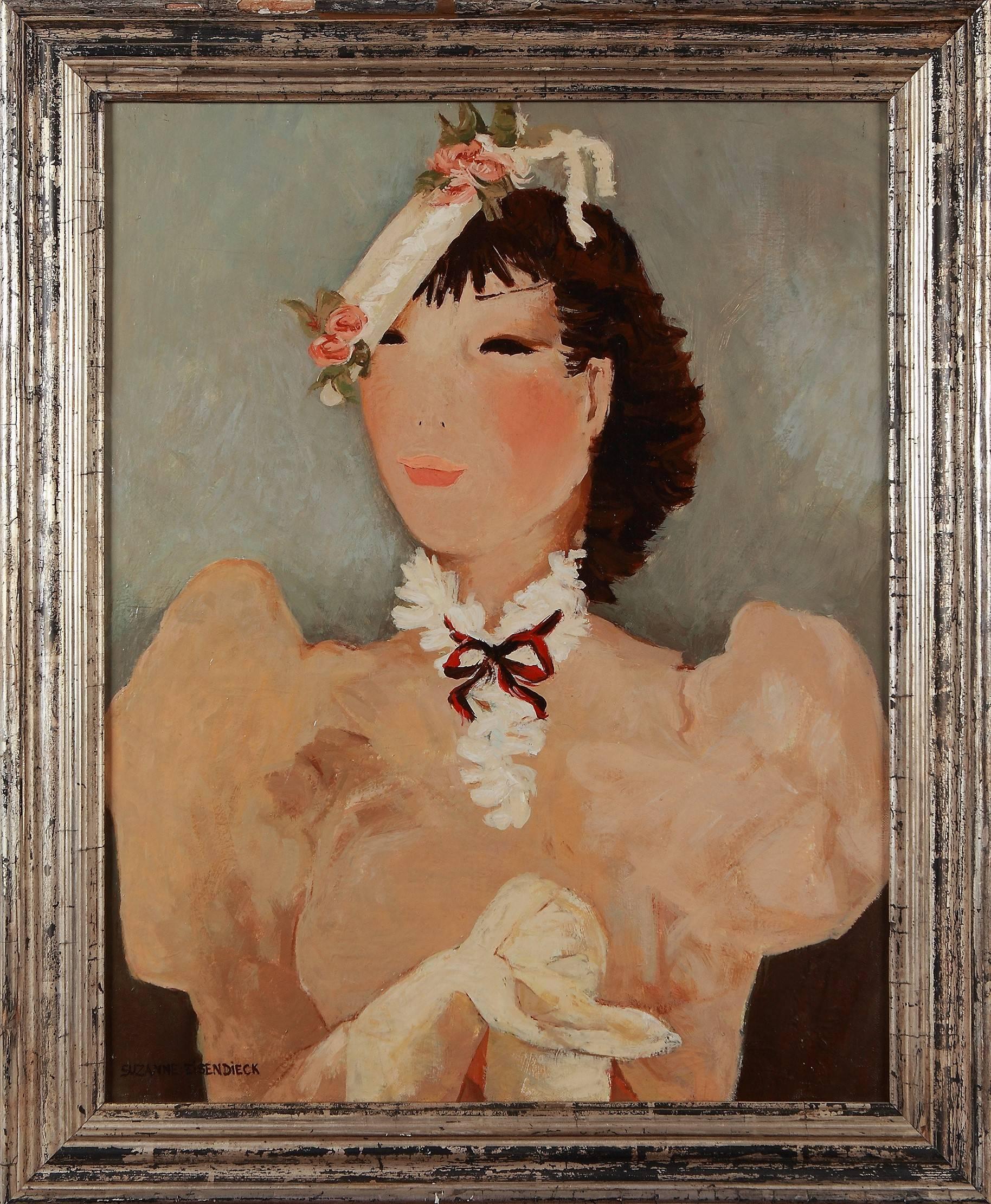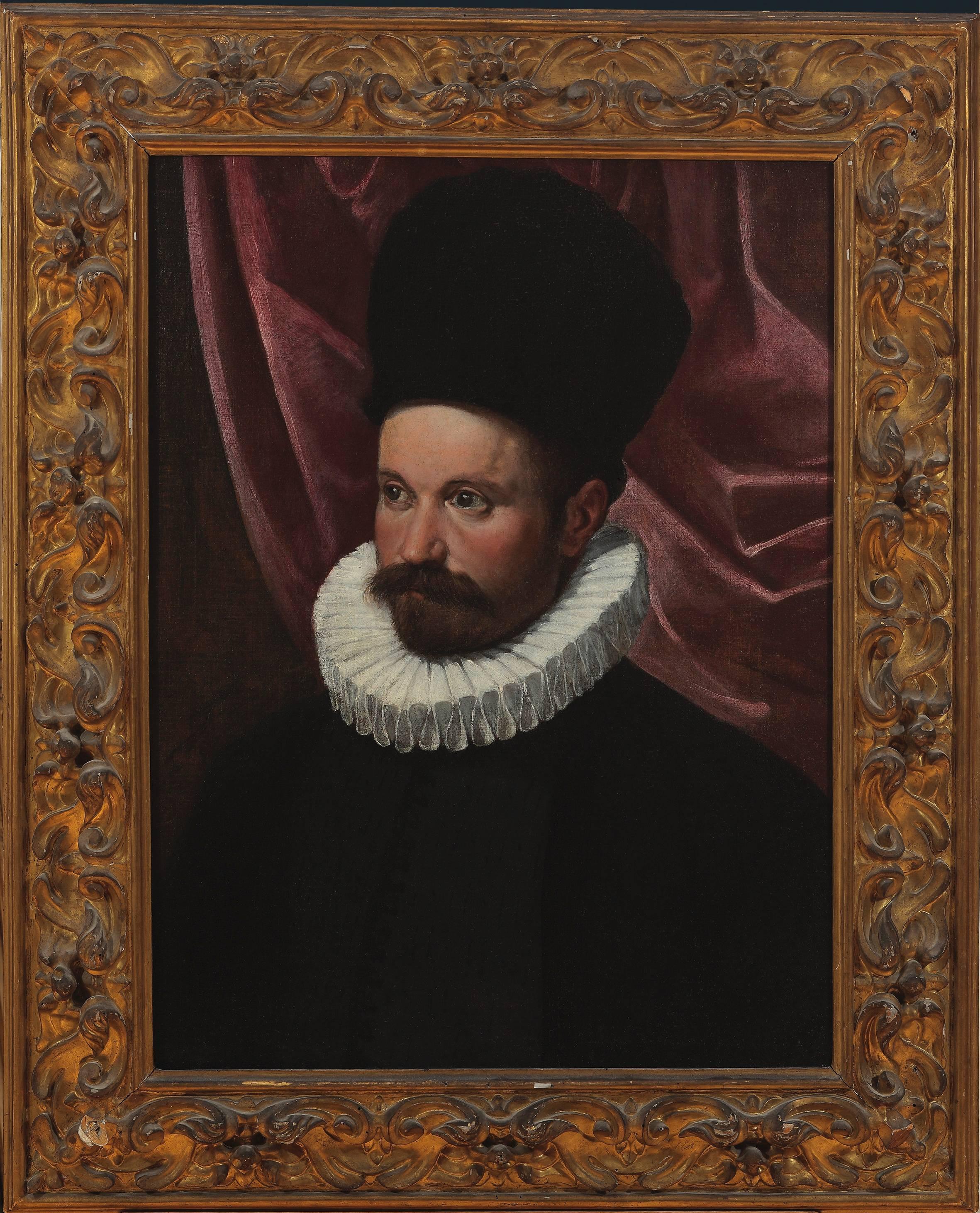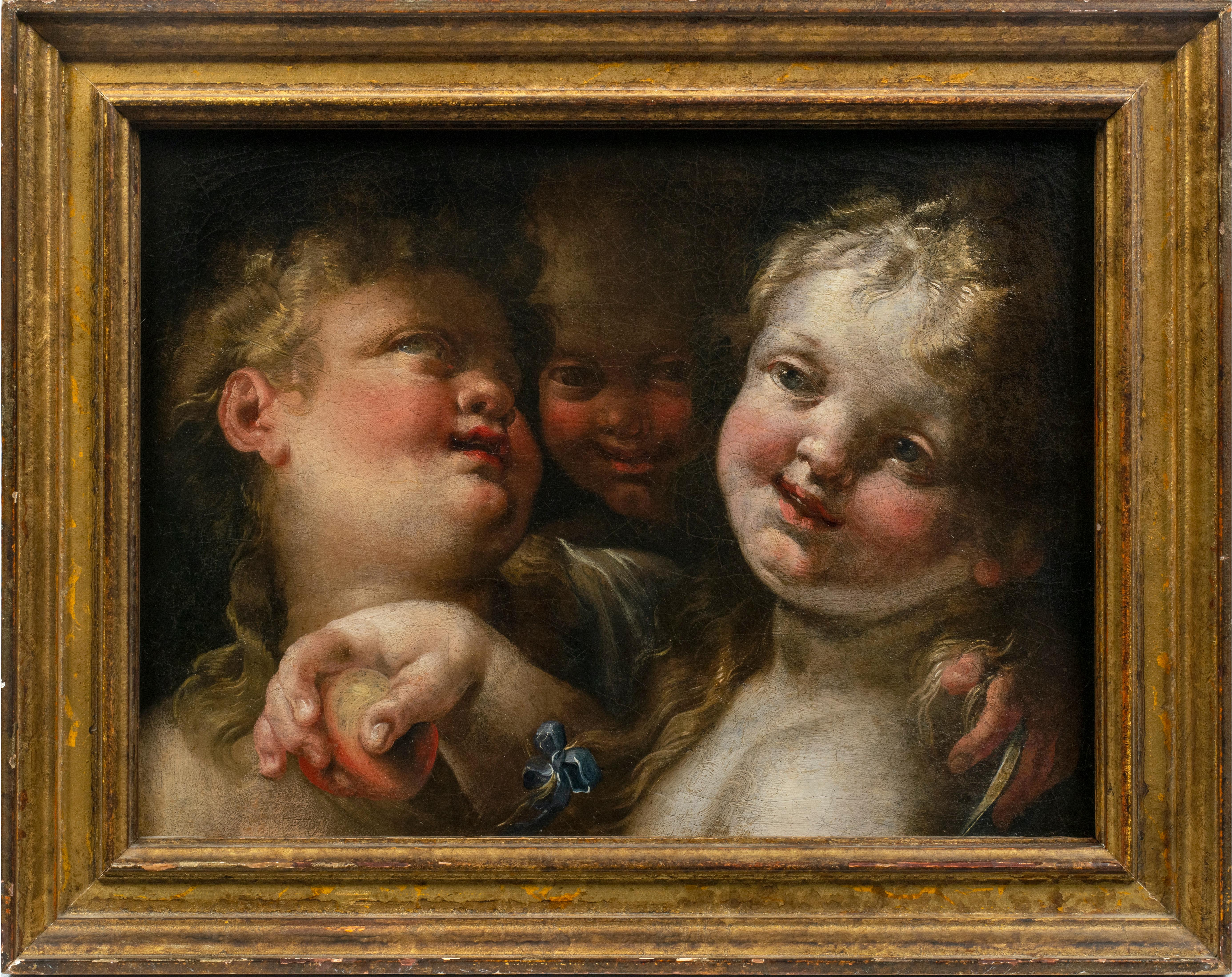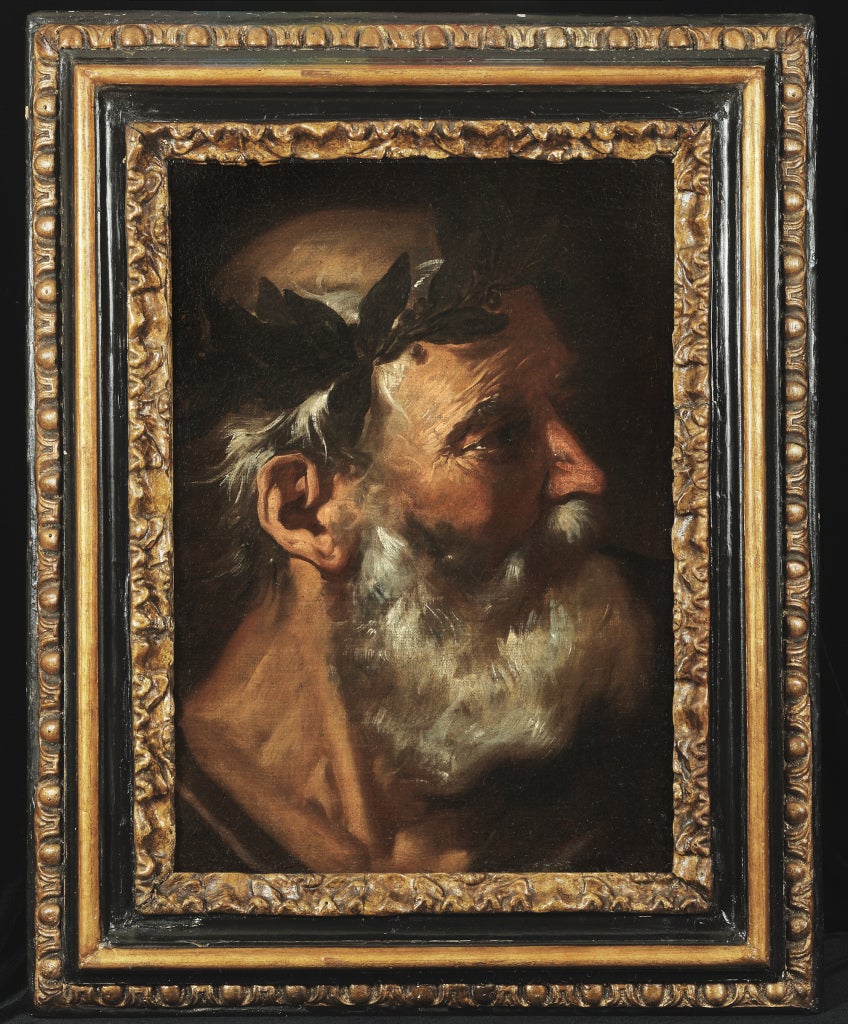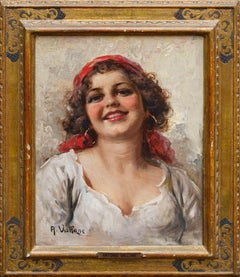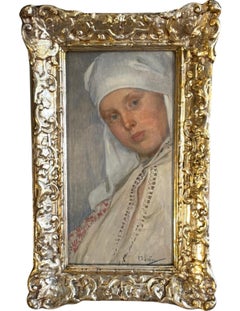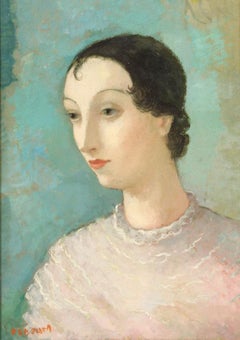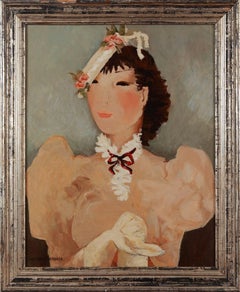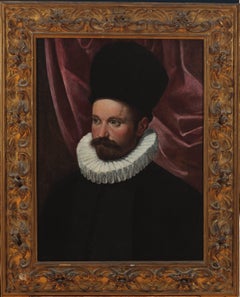Items Similar to Circle of Hieronymus van der Mij, pair of porters
Want more images or videos?
Request additional images or videos from the seller
1 of 24
Circle of Hieronymus van der Mij, pair of porters18th 18th Century
18th 18th Century
About the Item
Follower of Hieronymus van der Mij (Leiden, 1687 - 1761)
Pair of wheel holders
(2) Oil on canvas, 46 x 39 cm
with frame 63 x 55 cm
The pendant in question, depicting a fruit seller and a vintner, refers to 18th-century Dutch production that was particularly sought after by the now-established middle class. Genre and market scenes were in vogue as early as the early 17th century and continued their fortunes until well into the 1700s. One can recognize the influence of an artist born in Leiden in 1687, Hieronymus van der Mij.
On June 1, 1686, Philip van der Mij (1654-1721) and Jannetje Rijs were married in Leiden. On May 8 of the following year their eldest son Hieronymus was born. Philip was a foundryman of sculptures and vases and is known for some monumental garden vases designed by his fellow citizen Willem van Mieris. His son Hieronymus was trained by van Mieris as a painter. However, Philip entered Leiden University at the age of 22 in 1710. Like Rembrandt a century before him, van der Mij was registered as a student in his hometown for the privileges and exemptions associated with academic status, without ever taking any courses. It took until 1724 before the artist entered the guild of St. Lucas of Leiden, the same guild his father entered in 1702. In 1728 van der Mij bought a house in the Breestraat and lived there for the rest of his life, never marrying . In 1763 van der Mij became director of the Leiden Academy of Art, together with Frans van Mieris de jonge, son of Willem van Mieris. The artist died in 1761. His collection of prints and plaster sculptures was sold at auction six months after his death. His students were Pieter Catel, Johannes le Francq van Berkhey, Nicolaas Reyers, Nicolaas Rijnenburg, and Hendrik van Velthoven. Like his patron, the talented van der Mij specialized in genre painting, but he also painted portraits and historical scenes. He also designed tall vases that, presumably by his father, were cast in lead alloy. Hieronymus van der Mij also operated as an art dealer.
For a long period, van der Mij was mainly known as a portrait painter because of his work for the upper middle class and university professors. Eventually his talent for historical and genre painting was recognized. Because of recent publications, the reputation of van der Mij's work is changing.
- Creation Year:18th 18th Century
- Dimensions:Height: 18.12 in (46 cm)Width: 15.36 in (39 cm)
- More Editions & Sizes:cm 46 x 39Price: $3,328
- Medium:
- Circle Of:Hieronymus van der Mij (1687 - 1761, Dutch)
- Period:
- Condition:
- Gallery Location:Milan, IT
- Reference Number:1stDibs: LU2639215867012
About the Seller
No Reviews Yet
Vetted Professional Seller
Every seller passes strict standards for authenticity and reliability
1stDibs seller since 2023
- ShippingRetrieving quote...Shipping from: Milan, Italy
- Return Policy
Authenticity Guarantee
In the unlikely event there’s an issue with an item’s authenticity, contact us within 1 year for a full refund. DetailsMoney-Back Guarantee
If your item is not as described, is damaged in transit, or does not arrive, contact us within 7 days for a full refund. Details24-Hour Cancellation
You have a 24-hour grace period in which to reconsider your purchase, with no questions asked.Vetted Professional Sellers
Our world-class sellers must adhere to strict standards for service and quality, maintaining the integrity of our listings.Price-Match Guarantee
If you find that a seller listed the same item for a lower price elsewhere, we’ll match it.Trusted Global Delivery
Our best-in-class carrier network provides specialized shipping options worldwide, including custom delivery.More From This Seller
View AllPair of portraits follower of Philippe de Champaigne
Located in Milan, IT
Follower of Philippe de Champaigne (Brussels, May 26, 1602 - Paris, August 12, 1674)
Pair of portraits
(2) Oil on canvas , 58 x 44 cm
with frame, 67 x 54 cm
A sense of deep stil...
Category
17th Century Portrait Paintings
Materials
Cotton Canvas, Oil
By Lorenzo Delleani, Ezzelino da Romano contemplates the massacre of Vicenza
Located in Milan, IT
Lorenzo Delleani (Pollone, 1840 - Turin, 1908)
Ezzelino da Romano contemplates the massacre of Vicenza
Oil on canvas, 146x116 cm
Framed, 170 x 140 cm
Signed and dated 1863 lower ...
Category
19th Century Other Art Style Portrait Paintings
Materials
Canvas, Oil
By Antonio Vallone (active in Naples in the 20th century), Portrait of a Young Man
Located in Milan, IT
Antonio Vallone (active in Naples in the 20th century)
Portrait of young man with red scarf
Oil on canvas, 40.5 x 30.3 cm
Framed, 52 x 42 cm
Signed lower left: A. Vallone
The cu...
Category
Early 20th Century Other Art Style Portrait Paintings
Materials
Canvas, Oil
By Gortzius Geldorp, Manly Portrait
Located in Milan, IT
Gortzius Geldorp (Leuven, 1553 - Cologne, 1618)
Portrait of a man
Oil on panel, 52 x 45 cm
Framed, 56.5 x 45 cm
Dated and monogrammed at upper right: AN° 1605. GG F.
Geldorp Go...
Category
17th Century Other Art Style Portrait Paintings
Materials
Oil, Board
By Pierre Mequignon, Portrait of Carlo Gozzi
Located in Milan, IT
Peter Mequignon (1768-1826), 1794
Portrait of Carlo Gozzi
Oil on panel, 15 cm x13
Base cm 27 x 18
Dated and signed "P. Mequignon 1794"
The protagonist portrayed, identified by ...
Category
18th Century Other Art Style Portrait Paintings
Materials
Oil, Board
By Paolo Paoletti, still life with fruit, vegetables and mushrooms
Located in Milan, IT
Paolo Paoletti (Padua, c. 1671 - Udine, 1735)
Still life with vegetables, fruit and mushrooms
Oil on canvas, 76 x 106 cm
Framed, 87 x 117 cm
Critical Record Prof. Alberto Crispo...
Category
17th Century Other Art Style Still-life Paintings
Materials
Canvas, Oil
You May Also Like
'Obraz-Divka' (The Girl) by Alphonse Mucha - Original Mucha Portrait Painting
By Alphonse Mucha
Located in Carmel, CA
The American Art Gallery takes immense pride in offering "The Girl - A Study for the Slav Epic," an authentic original work by the celebrated Art Nouveau icon, Alphonse Mucha. Dating...
Category
1910s Art Nouveau Portrait Paintings
Materials
Canvas, Oil
Oil on Canvas "L' Espagnole" by Dietz Edzard, 1935
By Dietz Edzard
Located in Berlin, DE
Dietz Edzard ( German/French 1893-1963 ). Oil on canvas, 1935. With the artist's signature stamp at lower left. Framed.
Property of the Estate of Dr. Max Stern sold for the benefit o...
Category
1930s Post-Impressionist Portrait Paintings
Materials
Canvas, Oil
Suzanne Eisendieck "Chapeau Printanier. La Parisienne" Oil Painting on Canvas
By Suzanne Eisendieck
Located in Berlin, DE
Oil on canvas, circa 1950, by Suzanne Eisendieck ( 1906-1998 ) Signed lower left: SUZANNE EISENDIECK
Dimensions: 22.04 x 17.51 in ( 56 x 44,5 cm ). Framed: 26.37 x 21.45 in ( 67 cm x...
Category
1950s Post-Impressionist Portrait Paintings
Materials
Canvas, Oil
Portrait of a Gentleman
By Ippolito Scarsella (Scarsellino)
Located in New York, NY
Provenance: Suida-Manning Collection, New York
Private Collection
Exhibited: Venetian Paintings of the Sixteenth Century, Finch College Museum of Art, New York, October 30-December 15, 1963, no. 31.
Veronese & His Studio in North American Collections, Birmingham Museum of Art, Oct. 1-Nov. 15, 1972, and Montgomery Museum of Fine Arts, Dec. 5-Dec. 31, 1972
Literature: Robert L. Manning, A Loan Exhibition of Venetian Paintings of the Sixteenth Century, exh. cat. New York 1963, cat. no. 31ill., as by Veronese
Stephen Clayton and Edward Weeks, eds., introduction by David Rosand, Veronese & His Studio in North American Collections, Birmingham 1972, as by Veronese, p. 38 ill.
Terisio Pignatti, Veronese, Venice 1976, I, p. 199, cat. no. A225, II, fig. 908, as attributed to Veronese
Terisio Pignatti and Filippo Pedrocco, Veronese; catalogo completo dei dipinti, Florence 1991, no. 54°, as attributed to Veronese.
Terisio Pignatti and Filippo Pedrocco, Veronese, Milan 1995, II, pp. 517-518ill., cat. no. A 56, under attributed paintings, by Veronese and workshop)
John Garton, Grace and Grandeur; The Portraiture of Paolo Veronese, London-Turnhout 2008, p. 237, fig. 77, cat. no. R16, as workshop of Veronese.
Scarsellino’s art is widely regarded as critical link between the Renaissance and the Baroque styles in Emilian painting; not only was he an important transmitter of the heritage of the Renaissance, but he was also open to innovative ideas, and was one of the earliest to experiment with the trend to naturalism that would become fundamental to art of the new century. Born around 1550, he received his earliest training from his father Sigismondo, an architect and painter; it was probably while working at his father’s side as a youth that he acquired the nickname Scarsellino, or “little Scarsella”. After absorbing the principles of his art in Ferrara and Parma, he went to Venice in 1570, staying for four years and working in the shop of Veronese. In the following decade, his art —especially in terms of its piety and its development of landscape— demonstrates a strong sympathy with that of the Carracci, with whom he worked in 1592-1593 at the Palazzo dei Diamanti in Ferrara. Maria Angela Novelli and later Alessandra Frabetti both propose that Scarsellino traveled to Rome, although such a trip has not been documented; if he did travel to Rome, it probably would have occurred during the years that Scarsellino’s colleagues Agostino and Annibale Carracci were there, that is, beginning in 1595 and until 1609. The last decades of Scarsellino’s career again involve stylistic experimentation, this time in a manner that would bring his work very close to the progressive figurative naturalism of Carlo Bononi and prepare the way for Guercino.
The present portrait of a distinguished gentleman had been long thought to be by Paolo Veronese and was in fact attributed to him by such distinguished connoisseurs as Adolfo Venturi and Wilhelm Suida. The portrait’s style is, however, distinct from Veronese’s, although clearly indebted to it, and the attribution to the young Scarsellino is wholly convincing. The painting would then date from the 1570s – a date confirmed by the costume the subject wears. The puffed hat that appears in the painting had a rather short-lived vogue in the early 1570s. One sees it in Giambattista Moroni’s Portrait of Count...
Category
18th Century and Earlier Baroque Portrait Paintings
Materials
Canvas, Oil
Three Angels
By Domenico Piola the Elder
Located in New York, NY
Provenance:
Robert L. and Bertina Suida Manning, New York, until 1996
Private Collection, USA
One of the leading artists in Genoa during the second half of the seventeenth century, Domenico Piola came from a successful family of artists, renowned for their many illusionistic ceiling programs throughout Genoese churches and palaces. A prolific draughtsman and painter, Domenico oversaw an extremely productive studio. In addition to his collaborations with numerous other artists, Domenico also provided many designs for book illustrations and prints that circulated throughout Europe, earning him international exposure and high acclaim in his own day.
As Dr. Anna Orlando has indicated (written communication), the present work is an early work by Piola, datable from the late 1640s. At this time the young artist came strongly under the influence of Castiglione and Valerio Castello, while admiring the works of Giulio Cesare Procaccini. Piola’s works from this period are exuberant and fluid, and the artist’s love of portraying children is evident from the angels and putti that populate both his altarpieces and more intimate paintings.
The present work depicts three angels...
Category
17th Century Baroque Figurative Paintings
Materials
Canvas, Oil
Head of a Classical Poet (Socrates?)
By Pier Francesco Mola
Located in New York, NY
Provenance:
Possibly Antonio Amici Moretti, Rome, 1690
Roy Clyde Gardner, Union, Mississippi, 1970s until 2004; by whom given to:
Mississippi Band of Choctaw Indians, 2004-2010
Lit...
Category
17th Century Baroque Paintings
Materials
Canvas, Oil
Recently Viewed
View AllMore Ways To Browse
Portrait Pendant
Antique Portrait Pendant
Di Frutta
De Jonge
Prima Classe
Slim Aarons Palm Springs Pool
Spanish 17th Painting
Tall Sculpture Famous
Vintage Concert Posters Art Posters
Western Block Print
Abandoned Church
Affiche Paris
Authentic Vintage Poster
Henry Moore Bronze
Holocaust Memorial
J Victor
Joan Miro 1961
Learn In English
